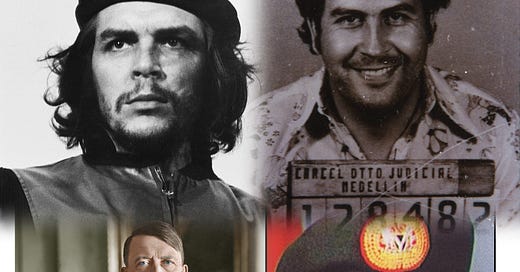The Charisma Dilemma: Why Are We Drawn to Flawed Leaders?
Dissecting the strange allure of powerful personalities through the lens of history and psychology.
The Mystery of Charismatic Figures
We've all at some point been drawn to our favorite tv characters,figures like robin hood who steals from the rich and give to the poor and the charismatic drug lord don pablo escobar who's even had movies made about him.
But the question is:
Why are some people magnetically drawn to charismatic figures—even when these figures stand in clear opposition to morality and compassion? Take Adolf Hitler, for example. It’s well-documented that his personality commanded intense loyalty. Despite orchestrating one of the greatest atrocities in human history, there are still people fascinated by his charisma.
This isn’t about glorification—it’s about asking why. Why do people still resonate with certain energies, despite overwhelming evidence of destruction? This paradox lies at the core of understanding charisma’s dark side.
The Psychology Behind It
Charisma Creates Emotional Attachment
People often align with strong personalities not because of their values, but because of how they feel around them. This emotional connection can overshadow rational judgment and moral considerations. Charismatic figures have an innate ability to make people feel seen, heard, and important, which creates a magnetic bond.
I mean just take a look at hitler,he orchestrated the killing of over 11 million people
But he also posessed exceptional oratory skills along with propaganda and manipulation which he used to shape public opinions and justify his actions i mean dude even employed techniques such as the "enemy" narrative, youth indoctrination, and news control to influence the masses.
Projection Plays A Role
These figures stir our deep desires for strength,certainty and power especially when we feel powerless ourselves.when we're uncertain or insecure we're drawn to those who seem to have the answers,whether or not they actually do.
Moral Dissonance Gets Overriden By Identity
When a leader taps into people’s pain, shame, or longing for meaning, they bypass logic and go straight for the soul. The emotional attachment they form is so strong that it becomes a part of one's identity, leading them to justify behavior that contradicts their values.
The Social Dimension: Why We Follow in Times of Crisis
In times of chaos or insecurity, people tend to follow those who appear decisive—even if their actions are unethical. This attraction reflects a deeper existential hunger for order, purpose, and belonging. Charismatic leaders offer a sense of stability in a world that feels otherwise unstable. It’s not always about the individual—it’s about what they promise: a way out of suffering or confusion.
So What Does This Say About Us?
It says that our attraction isn’t just to people—it’s to what they represent inside of us: strength, fearlessness, control, vision. These qualities can be used for good or evil. The danger lies in idolizing these traits without questioning their source or the conscience behind them.
When we don’t examine our own shadows, we risk idolizing figures who embody our desires for power and certainty—without regard for the consequences of their actions. This can lead us down a dangerous path, where charisma becomes a tool for manipulation rather than inspiration.
Closing Reflection: The Daily Mind’s Challenge
The Daily Mind doesn’t come to judge—it comes to ask:
What makes a person truly worthy of admiration?
Is it charisma—or character?
And are such figures with low moral standards fit to be role models?
It’s a question we must all wrestle with. In a world where charisma can mask deeper flaws, the answer lies not in the superficial attraction to power, but in the examination of the values and integrity behind the leader.
And if history has taught us anything, it's that we must hold those we choose to admire—and follow—as role models to a higher moral standard




This was a very eye opening article and sadly it's the truth too